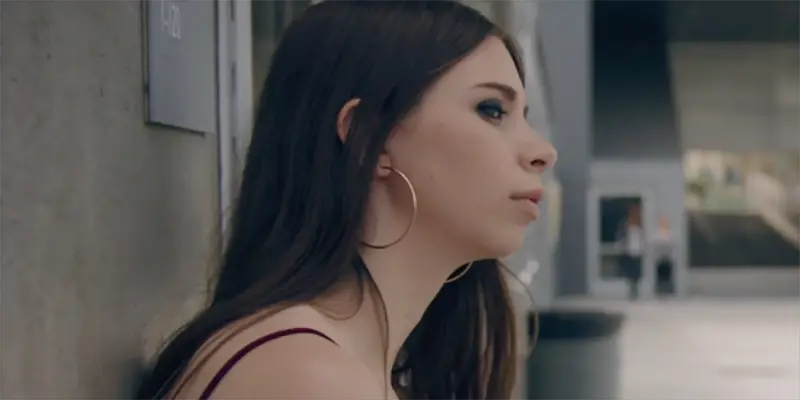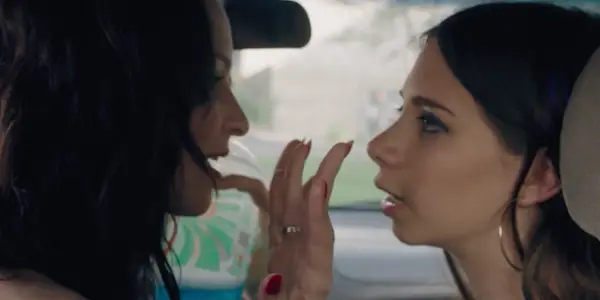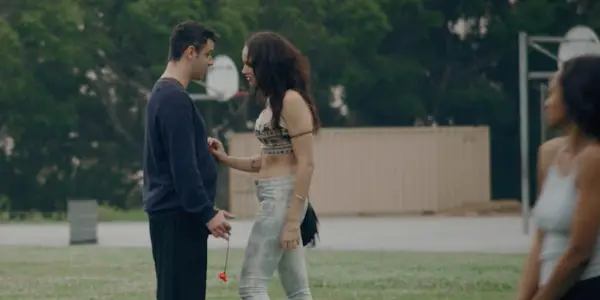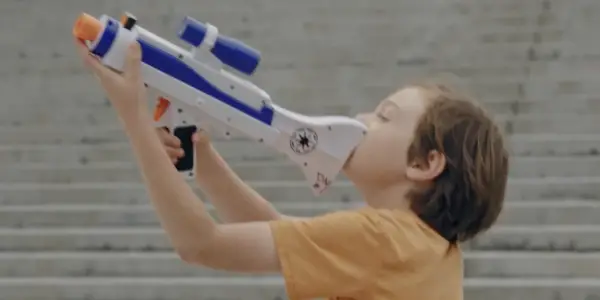AFTER SCHOOL: A Lesson In Disappointment

Jacqui Blue has a lifetime background in theater and writing.…
After School, directed by Alec Tibaldi and written by Tibaldi and co-writer Anne Berkowitz, is a film where the deserved praise goes to the technical crew over the story-line and talent. The film stars Piper De Palma and Ruby Modine as sisters Addie and Xandra in this short drama.
Instead of a dramatic story, the film feels like a story about dramatic people. I want to give it credit for having a female-driven cast, but am disappointed that it fails the Bechdel Test with the opening dialogue.
Not Your Typical After School Special
Addie (Piper De Palma) wants to get to dance rehearsal after school but her obstacle is that she doesn’t have a ride to get there. The opening leads you to believe it is about an after school dance class. But the only bit of dancing we see at all is the minor shuffling of feet in the very opening scene.
In the second act, we meet her older sister Xandra (Ruby Modine), who comes to pick her up from school. When she shows up, she isn’t alone. Along with her is her son Derek (David Lansky), believably seven or eight years old. We learn right away that Xandra doesn’t want to be Addie’s ride to dance rehearsal, but is coerced into it with babysitting bribery from her sister.

Then comes the inciting incident which is confusing to the audience and changes the entire tone of the film. Now secure in the idea that she has a ride to rehearsal, Addie gets gossipy with Xandra about what happened at school that day. The delivery of this dialogue felt unnatural. But what was more uncomfortable was what was to follow.
Shifting Stories
Outraged and over-dramatic, Xandra now feels compelled to seek out Mr. Adler (Ronan Barbour) and confront him. She turns to her son and tells him she’ll be right back with a promise of cheeseburgers upon her return. When Xandra leaves, Addie gets a call from one of the girls on her dance team, letting her know she’s off the team for missing rehearsal. So, what does an emotional Addie do? Of course, like any responsible high school kid, she leaves the child alone in the car while she goes to freshen up in the bathroom.
Now Derek has been left alone in a hot unlocked car with a toy gun. What would any curious child, who is not strapped into a car seat, do in that situation? He lets himself out of the car and begins to wander around this high school campus alone with a big toy gun.
Xandra has found Mr. Adler and is confronting him while Addie and Derek both dramatically appear in the distance. Mr. Adler looks to the boy and asks if that’s his son, in what I can only assume is intended to be the film’s climax, but leaves the audience feeling predictably underwhelmed. It feels like once again the protagonist might change and shift focus again but instead it just abruptly ends.
Characters Lacking Character
These are a handful of unlikable characters within After School. Addie and Natasha (Tijera Wright) come off as self-absorbed mean girl types, like a two-dimensional urban Betty & Veronica. Xandra comes across as shallow and emotionally unstable. Derek is cute but obnoxious. And Mr. Adler? He sleeps with his students; enough said?

Xandra’s actions don’t make sense to me. If she had a kid so many years ago with her former teacher, she would know by now that she wasn’t the first nor the last. Therefore, her extreme reaction is out of place to Addie’s high school gossip. The way her personality flips from hot to cold in a matter of seconds, and her demeanor from the minute she pulls up until the very end, is that of an emotionally unstable and selfish person.
Xandra’s own outburst even cost her younger sister, Addie, the one thing that meant the most to her – her dance team. This is an example of how Xandra’s instability had serious consequences on someone else’s life. This is not a likable character and the film doesn’t go on long enough for her to prove otherwise to the audience.
You Get What You Pay For
I’m willing to bet that the majority of, if not all, the budget for After School went to cinematography and post-production. That’s where the quality shines in this piece. The cinematography shot by Jeff Tomcho was done well: great angles and beautifully shot. Nice camera work. It felt like we were right there in the world with them.
The editing was great, and was cut together well by Yannis Zafeiriou. The film looked and sounded good on a technical level. My only complaints here are when the girls are walking through the hall after class to their lockers, and we only see them shot from the back.
I expected to see it cut to the front of them because they were talking, and I like to see an actor’s face when they are having a conversation. A moment later I understood why this decision was made. There was an audio issue, which becomes clear when Natasha turns around and her mouth isn’t moving but she’s still finishing her sentence.

The film could have benefited from having a continuity or script supervisor. When Xandra shows up she has a 7-11 slushie that is mostly full and still frozen – less than 30 seconds later it is watered down and mostly empty. Having gone with an opaque cup would have worked better to keep up the illusion. This is a small detail but it’s a very noticeable one when your beverage of choice is electric blue and melting.
In Conclusion
There are some strong issues that are touched upon in After School, and I feel like the filmmakers missed an opportunity to say something important by confusing their story-line and trying too hard.
Touching upon the issue of a child being neglected by young and irresponsible teenagers, which leads to the child walking around campus with a toy gun could lead to a very tragic but political story to tell. For a minute I thought that’s where they were going with it. That would have made for a more satisfactory end, because then the story would have had some closure and the filmmakers would have a chance to say something important. At it stands, there is no closure and I’m not sure what the film is trying to say.
The story for After School feels incomplete, and the dialogue is poorly written. The characters are uninteresting and cliché. The story is too short for us to get to know enough about these characters to see any genuine or redeeming qualities that engage the audience into caring about who they are, what they want, and if they get it at the end. But this is a story that fails to even satisfy with clarity who the main character is, which confuses the rest of the plot. In the end, After School leaves much to be desired with no clear resolution.
What was your favorite after school activity?
Does content like this matter to you?
Become a Member and support film journalism. Unlock access to all of Film Inquiry`s great articles. Join a community of like-minded readers who are passionate about cinema - get access to our private members Network, give back to independent filmmakers, and more.
Jacqui Blue has a lifetime background in theater and writing. After achieving international acclaim with her first film Beautiful Births, she was one of 10 Directors selected by James Franco for his Master Class, "Sex Scenes". She went on to work with Jared Padalecki & T.O.N.E-z in her suicide awareness documentary, I Chose Life: Stories of Suicide & Survival and appears on-screen next to Lou Diamond Phillips in The Last Train. www.jacquiblue.net













